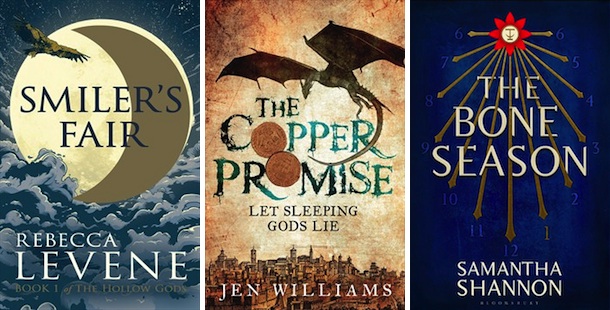In a recent interview, I was asked about fantasy writing in Britain today and specifically whether I thought there was a female fantasy scene. If there is, who are the authors, what are they writing and how are their works contributing to fantasy as a genre? To answer the first question, you don’t have to go far afield. The future of British fantasy looks bright thanks to a host of new authors, each of whom is bringing a fresh perspective to some well-mined tropes—tropes we all know and love. In January, I embarked on a quest to read as many of their books as I could. I wanted to get a sense of the themes that women deem important in fantasy fiction and how their exploration of those themes enriches the genre as a whole.
What follows is not a ‘best of’ list. It’s an honest look at the books that just a few women are writing today in Britain. Some names you’ll know, others perhaps you won’t, but I hope one or two will strike a chord and convince you to give their books a try.
Rebecca Levene: Smiler’s Fair (Hodder)
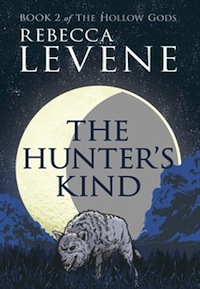 What do women bring to epic fantasy? One thing that Levene and Jen Williams (discussed below) have in common is their focus on characterisation. The way in which Williams and Levene use characterisation to define the plot is highly modern and a clear move away from the fantasy of the 70s and 80s, where the plot tended to define the characters. It sounds like a fine distinction, but it’s hugely important because it gives agency back to our protagonists; it allows us to hear them, to witness the individual shaping their own life so that events happen because of their choices, not in spite of them. In the past, epic fantasy has relied heavily on the use of prophecy, or Destiny with a capital D. Levene’s five protagonists are on their own; they hold their fates in their hands.
What do women bring to epic fantasy? One thing that Levene and Jen Williams (discussed below) have in common is their focus on characterisation. The way in which Williams and Levene use characterisation to define the plot is highly modern and a clear move away from the fantasy of the 70s and 80s, where the plot tended to define the characters. It sounds like a fine distinction, but it’s hugely important because it gives agency back to our protagonists; it allows us to hear them, to witness the individual shaping their own life so that events happen because of their choices, not in spite of them. In the past, epic fantasy has relied heavily on the use of prophecy, or Destiny with a capital D. Levene’s five protagonists are on their own; they hold their fates in their hands.
First in a series, Smiler’s Fair is a new breed of fantasy. Refreshingly, it’s a scant four hundred pages long and yet it manages to create a rich, believable world full of diverse peoples and ways of life. Just like the Fair of the title, there’s something for everyone here. Levene takes the comfortable trope of prophesised hero reborn and covers it in darkness and ambiguity, so that when you encounter it as a reader, it’s unrecognisable. Smiler’s Fair is what Virginia Woolf once called Middlemarch: ‘one of the few English novels written for grown-up people.’ You can read my full review of the book at Fantasy Faction. The second novel in the series, The Hunter’s Kind, publishes this July.
Jen Williams: The Copper Promise and The Iron Ghost (Headline)
 Despite their similar emphasis on characterisation, Williams’ books are vastly different in both atmosphere and storyline. Both authors are writing a series, but there’s no overriding plot in either The Copper Promise or The Iron Ghost. Instead these are presented as stand-alone adventures with the distinct air of an RPG. The characters grow and change with each adventure, acquiring new skills and forging new relationships along the way. This approach is nothing short of marvellous—it’s this light, fun, immersive kind of fantasy that kindled my love for the genre in the first place and I’m fond of saying that Williams is reinventing traditional fantasy for a modern audience.
Despite their similar emphasis on characterisation, Williams’ books are vastly different in both atmosphere and storyline. Both authors are writing a series, but there’s no overriding plot in either The Copper Promise or The Iron Ghost. Instead these are presented as stand-alone adventures with the distinct air of an RPG. The characters grow and change with each adventure, acquiring new skills and forging new relationships along the way. This approach is nothing short of marvellous—it’s this light, fun, immersive kind of fantasy that kindled my love for the genre in the first place and I’m fond of saying that Williams is reinventing traditional fantasy for a modern audience.
Perhaps we’re in the field of heroic rather than epic fantasy, as it’s clear the characters carry the story. Still it’s not all fun and games; the situation our heroes encounter in The Iron Ghost has its roots very much in this world, a classic clash of ideologies. That conflict provides an intellectual backdrop to the action, as we follow the rebirth of a dangerously unstable mage with too much power and too few morals. Like Levene, Williams writes inclusive fantasy. Both authors explore diverse cultures, sexualities and behaviours in order to create realistic characters and situations. Matriarchal societies appear in both authors’ works—how refreshing!—and none of it seems forced. Subverting tropes for the sake of subverting tropes is as much a part of the problem as the limitations inherent in those tropes, but I’m happy to say that both fantasy series are progressive works written with integrity and understanding, and both come highly recommended. For those interested, here’s my full review of The Iron Ghost.
Francesca Haig: The Fire Sermon (HarperVoyager)
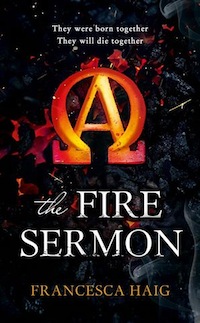 Now for something completely different. I admit I had trouble with this book. For me, characterisation is the most important element of any story. If it doesn’t work or falls short as it does here, it can seriously damage my overall enjoyment of a book. That’s a shame because Haig’s theme is an important one and the underlying idea is compelling. Set in a post-apocalyptic world, which has altered the reproductive pattern of the human race, every birth results in twins: one perfectly formed ‘Alpha’ and its accompanying ‘Omega’ twin, born with some kind of deformation or disability. Naturally Omegas are treated as second-class citizens, ostracised, reviled, scraping a living off the poorest land or forced into Alpha workhouses by poverty. We’re very much in Huxley and Orwell territory where people are defined by image and genetic status.
Now for something completely different. I admit I had trouble with this book. For me, characterisation is the most important element of any story. If it doesn’t work or falls short as it does here, it can seriously damage my overall enjoyment of a book. That’s a shame because Haig’s theme is an important one and the underlying idea is compelling. Set in a post-apocalyptic world, which has altered the reproductive pattern of the human race, every birth results in twins: one perfectly formed ‘Alpha’ and its accompanying ‘Omega’ twin, born with some kind of deformation or disability. Naturally Omegas are treated as second-class citizens, ostracised, reviled, scraping a living off the poorest land or forced into Alpha workhouses by poverty. We’re very much in Huxley and Orwell territory where people are defined by image and genetic status.
Our protagonist Cassandra’s Omega deformity is not readily visible: she’s a seer, doomed to go mad eventually. The limits of her ability are unclear and opinion is divided over whether it’s a gift or a curse. She’s a highly reactive character, which isn’t necessarily a bad thing because it leaves her open to develop in subsequent books, but I found her general aimlessness and self-pity difficult to empathise with. Haig’s strength lies in her prose, which is highly accomplished and paints a vivid picture of this destructive society. The most important things to take away from The Fire Sermon are Haig’s examinations of the loss of agency, exemplified by the state; the loss of self, exemplified by Kit and his amnesia; and the loss of individuality, emphasised by Cass’s repeated claims of not being able to imagine life without her twin.
Genevieve Cogman: The Invisible Library (Tor UK)
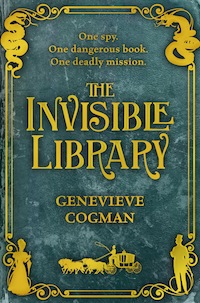 Another debut, The Invisible Library is a melting pot of myth, magic and multiple narratives. Part fantasy, part Victorian detective story, it uses an alternative London as its primary setting like Samantha Shannon’s Bone Season books (coming up below). Cogman’s London, however, is not a dystopia, but a celebration of the city as it appears in fiction, which ties in nicely with the story’s central idea. The titular Library is an eternal, extra-dimensional repository of fiction and protagonist Irene’s job as one of its Agents is to locate and ‘retrieve’ (which sometimes means steal) books to add to its vast collection. Sounds simple enough? Wrong—there are a limitless number of parallel worlds in Cogman’s universe and some of them are home to a host of creatures—vampires, werewolves, the Fae—who make Irene’s job particularly perilous.
Another debut, The Invisible Library is a melting pot of myth, magic and multiple narratives. Part fantasy, part Victorian detective story, it uses an alternative London as its primary setting like Samantha Shannon’s Bone Season books (coming up below). Cogman’s London, however, is not a dystopia, but a celebration of the city as it appears in fiction, which ties in nicely with the story’s central idea. The titular Library is an eternal, extra-dimensional repository of fiction and protagonist Irene’s job as one of its Agents is to locate and ‘retrieve’ (which sometimes means steal) books to add to its vast collection. Sounds simple enough? Wrong—there are a limitless number of parallel worlds in Cogman’s universe and some of them are home to a host of creatures—vampires, werewolves, the Fae—who make Irene’s job particularly perilous.
I loved this book. Irene is everything a good librarian should be: serious, passionate and not a little bit scary. She’s also sarcastic and likable and despite the presence of two men in the vicinity, she’s the one calling the shots. She’s not your typical hero, but copes brilliantly under pressure, using her best and most formidable weapon: her mind. She is rather unique in this regard, as a large number of female fantasy heroes tend to solve problems through physical violence—a natural, but no longer original repudiation of the damsel in distress motif. Irene inhabits a position of academic authority and is a champion of the new order of fantasy in which, for once, it’s women who define men. A full review is here.
Samantha Shannon: The Bone Season and The Mime Order (Bloomsbury)
 Shannon is another author who has taken up this standard. Our protagonist is Paige Mahoney, a young woman whose refusal to be defined by the men around her earns her as much enmity as it does respect. She becomes a constant challenger of the status quo, a champion of the oppressed, and she does it all with an indomitable sense of self, which is made manifest by her dreamscape—that individual mental space we each of us inhabit. I’ve just finished reading The Mime Order and really, these books are wonderful. Not only is the prose fluid and easy to read, but the dystopian themes are presented with dexterity and understanding, and the characters are realistically shaped by the system that controls their lives.
Shannon is another author who has taken up this standard. Our protagonist is Paige Mahoney, a young woman whose refusal to be defined by the men around her earns her as much enmity as it does respect. She becomes a constant challenger of the status quo, a champion of the oppressed, and she does it all with an indomitable sense of self, which is made manifest by her dreamscape—that individual mental space we each of us inhabit. I’ve just finished reading The Mime Order and really, these books are wonderful. Not only is the prose fluid and easy to read, but the dystopian themes are presented with dexterity and understanding, and the characters are realistically shaped by the system that controls their lives.
It’s a brutal world Shannon’s created and a vivid one. Paige’s London is brought to life in The Mime Order, from dank tunnels to colourful market squares. It’s a figurative manifestation of the chaos that is both the strength and weakness of the voyant syndicate—chaos that makes it doubly hard to plant the seeds of true rebellion. We see humanity in all shades, from sordid to honourable, ignorant to progressive, intolerant to accepting. This isn’t a fight for equality between sexes or classes, but for equality between voyants and amaurotics (normal people). The voyants are fighting for the very right to be considered human beings and that’s a fight that goes right back to British colonialism, to the slave trade, to racial and religious oppression. We’re still facing inequality today and Shannon’s Scion London is an ominous example of where intolerance and corruption can lead.
Helena Coggan: The Catalyst (Hodder)
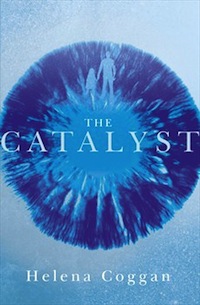 I’ll admit straight off that I can’t recommend this book. That doesn’t mean it isn’t worth reading—for a fifteen year old author, it’s a remarkable achievement. With a solid set-up, promising characters and quick-fire action, it had the potential to be excellent. The sole thing that let it down in my opinion was the author’s inexperience, which manifested most noticeably in the characterisation. It was a significant problem for me that the adults didn’t behave like adults and therefore few of their interactions rang true. There was nothing fundamentally wrong with the main character, Rose. I’d have liked to see her develop, but perhaps there’ll be opportunity for this in subsequent books. Point-of-view changes mid-sentence disrupted the flow of the narrative, as well as highlighting the lack of individual character voice. The pace was the one thing that rarely faltered and the relationship between Rose and her father was a good central theme.
I’ll admit straight off that I can’t recommend this book. That doesn’t mean it isn’t worth reading—for a fifteen year old author, it’s a remarkable achievement. With a solid set-up, promising characters and quick-fire action, it had the potential to be excellent. The sole thing that let it down in my opinion was the author’s inexperience, which manifested most noticeably in the characterisation. It was a significant problem for me that the adults didn’t behave like adults and therefore few of their interactions rang true. There was nothing fundamentally wrong with the main character, Rose. I’d have liked to see her develop, but perhaps there’ll be opportunity for this in subsequent books. Point-of-view changes mid-sentence disrupted the flow of the narrative, as well as highlighting the lack of individual character voice. The pace was the one thing that rarely faltered and the relationship between Rose and her father was a good central theme.
Coggan’s world is a bit dystopian, a bit post-apocalyptic: a setting that allows her to tackle issues such as social and political unrest, power struggles between classes and the threat of terrorism. Government corruption rears its ugly head amidst a discussion of how an individual’s actions can have unforeseen consequences. These are weighty subjects that offer plenty of dark corners to explore and their presence in The Catalyst testifies to Coggan’s promise as an author. In its present state, however, the book lacks the sophistication that comes with maturity and it’s a shame that Coggan didn’t sit on it for another few years. Still, this young author is one to watch.
Sarah Pinborough: The Death House (Gollancz)
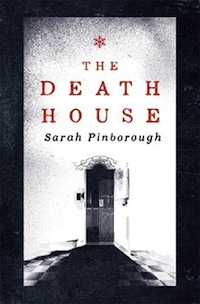 Not technically fantasy, but since we’re in the mood to discuss dystopias, here’s another one. The eerie thing about Pinborough’s world is how very real it is. From the characterisation to the setting to the mysterious defect that ‘changes’ its victims, this is the stuff of nightmares and hints at genetic experimentation gone wrong. In this age of increased medical understanding, where we’re able to play with the building blocks of life, the events of The Death House aren’t so fanciful. We are never explicitly told what happens to the children who succumb to the defective gene—they’re carted away to the sanatorium, never to be heard of again. The resulting climate of fear is pervasive and out of all the books on this list, The Death House was the only one that made my heart physically pound.
Not technically fantasy, but since we’re in the mood to discuss dystopias, here’s another one. The eerie thing about Pinborough’s world is how very real it is. From the characterisation to the setting to the mysterious defect that ‘changes’ its victims, this is the stuff of nightmares and hints at genetic experimentation gone wrong. In this age of increased medical understanding, where we’re able to play with the building blocks of life, the events of The Death House aren’t so fanciful. We are never explicitly told what happens to the children who succumb to the defective gene—they’re carted away to the sanatorium, never to be heard of again. The resulting climate of fear is pervasive and out of all the books on this list, The Death House was the only one that made my heart physically pound.
Pinborough’s writing is immersive, immediate, ugly, tender. It’s unrelentingly real and I had no trouble believing in her sinister world. This isn’t a likable book. It’s billed as a story that examines what it means to live and die, but I think it succeeds better as a horror. It’s a powerful piece of fiction that does more to entertain than it does to elucidate. That sounds like a criticism, but it’s actually the opposite. I didn’t read this book because it offered a perspective on the frankly incomprehensible reality of death. I read it because it sounded exciting and in that regard I wasn’t disappointed. Where it fell down in my opinion was the Romeo & Juliet style ending, which although romantic was not realistic. A friend doesn’t share this opinion: far from ruining the drama of what came before, he thought it beautiful and moving, which goes to show how subjectivity is everything. I’ve mentioned The Death House here because it differs from the books above in its sheer claustrophobic intensity. Admittedly it left me feeling depressed rather than enlightened or uplifted, but the important thing is that I felt. Whatever your opinion of a book, if it makes you feel, it’s doing something right.
These are only a handful of the women contributing to the fantasy scene today, but the issues they’re discussing form the breath and bones of our society. Fantasy is so much more than dragons and magic and myth (of course it’s that too), but the way in which this genre removes the familiar enables authors to throw issues like gender and identity into relief, forcing us to look at them in a different light.
When we’re presented with an opportunity to suspend our general disbelief, what else becomes easier to suspend? Our prejudices perhaps, our entrenched ideals, or the ways in which we’ve come to relate to the people we live among. In stories, we care about characters who battle the same monsters we do on all levels and aspects of our lives. That’s why we find them so compelling, why we’re always on the lookout for a new book or character in whom we see ourselves. But it’s just as important to seek out those books which reflect our world’s strengths and flaws, the problems we’ve yet to solve and the successes we’ve already achieved.
I hope you’ll share your thoughts in the comments below—agree, disagree, mention those women writing today who I didn’t get around to. I think we’ve got a great thing going here in the UK, a rich heritage to draw upon and new voices to keep the conversation alive.
Lucy Hounsom works for Waterstones and has a BA in English & Creative Writing from Royal Holloway. She went on to complete an MA in Creative Writing under Andrew Motion in 2010. Her debut epic fantasy novel, Starborn, is available now from Tor Books UK. Follow Lucy on Twitter @silvanhistorian.










